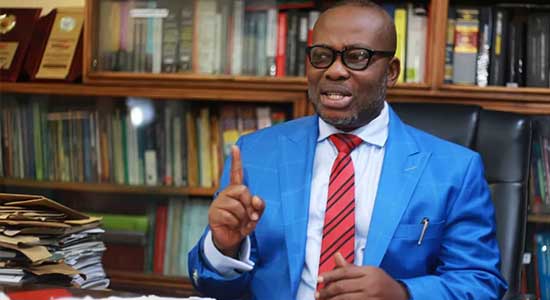Ubani Lauds Court
*Says Appeal by EFCC does not amount to stay of execution *Says laws should be amended to ensure law enforcement agencies fully investigate before arrest
The Chairman of the Nigerian Bar Association Section on Public Interest and Development Law (NBA-SPIDEL) and Former 2nd Vice President of the NBA, Dr. Monday Ubani, has commended the Court over the conviction of the EFCC Chairman over contempt of court, calling it a healthy development in Nigeria’s judiciary system.
In an interview with TVC news, Dr. Ubani hailed the conviction thus: “I must say this is a healthy development in our judicial system. When a court makes an order, every one affected by that order must obey it.”
Recalling the background of the conviction, Dr. Ubani noted that the order which the EFCC was in contempt was an order given in 2018, where the court had discharged and acquitted an individual under EFCC’s custody and ordered the release of his 40 million naira and car which had been seized.
“However this order was neither appealed nor obeyed, and it is who is heading the organization that would be the one responsible for the obedience of the court order”, Dr. Ubani said.
He also pointed out that an application for contempt proceedings had been filed based on the failure of EFCC to obey the court order and EFCC placed on notice.
According to Dr. Ubani, EFCC failed to respond to the application and the court had to hear the case averred by the applicant and had to go ahead to convict the EFCC boss for contempt of Court.
Speaking on the statement by the EFCC chairman that the EFCC would file an appeal to the order, Mr. Ubani stated that an appeal does not amount to a stay of execution.
His words read thus: “Appeal does not operate as a stay. I understand that the IG was directed to ensure that judgement of Court was complied with.
“ If he has filed an appeal, appeal does not in any way operate as a stay. There must be a proper stay of the judgement of that Court, because there was a proper order, unless there was a stay to that judgement, appeal does not operate as a stay.”
Furthermore, Dr. Ubani noted that the issue of obedience to court orders has been an issue that has plagued the Nigeria judicial system and legal profession.
He emphasized that the judiciary as a third arm of government must be respected, especially seeing that Nigeria is operating a democratic system.
According to Ubani, respecting the judiciary amounts to obeying all court’s orders unless appealed. However, he noted thus: “In Nigeria today, people in government choose which Court order they would obey or not obey which is not probably helping and developing our culture of obedience to Court order and even our democracy.”
On the implication of the court order of the conviction of EFCC boss over contempt, Dr. Ubani established that this is signal to those in public offices.
“What the court has done today, sends a signal to those in public offices that you must obey court order, failing which you would be convicted for contempt, and the contemptnor would not be given any hearing in court”, he said.
On the sluggish nature of trial process due to prosecution with little investigation, Dr. Ubani noted thus: “We have always advised that a different body carry out investigation while another carry out prosecution. In developed economies, before you bring in any accused person you must have done up to 90% of investigation before they arrest, but here, security agencies would first arrest then now start fishing for information or evidence, and that is why they engage in a manner of extracting confessional statement in a very autocratic manner that shows it was not gotten in a fair manner but through sometimes beating and suffering of the accused.”
On how to solve this, Dr Ubani emphasized that laws should be amended to insist that before you rein in any accused of any crime, one must have done a larger percentage of investigation and be convinced that the individual has committed the crime before bringing such person in. If there’s no evidence, what should be done in that circumstance is to release such a person 24 hours or maximum 48 hours later. “

